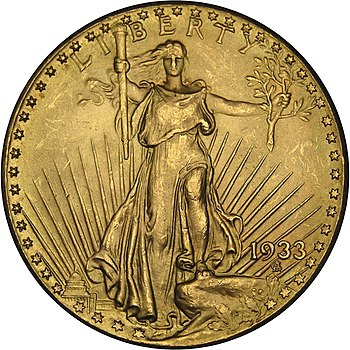Portal:Business
The Business and Economics Portal Business is the practice of making one's living or making money by producing or buying and selling products (such as goods and services). It is also "any activity or enterprise entered into for profit." A business entity is not necessarily separate from the owner and the creditors can hold the owner liable for debts the business has acquired. The taxation system for businesses is different from that of the corporates. A business structure does not allow for corporate tax rates. The proprietor is personally taxed on all income from the business. A distinction is made in law and public offices between the term business and a company such as a corporation or cooperative. Colloquially, the terms are used interchangeably. (Full article...) Economics (/ˌɛkəˈnɒmɪks, ˌiːkə-/) is a social science that studies the production, distribution, and consumption of goods and services. Economics focuses on the behaviour and interactions of economic agents and how economies work. Microeconomics analyses what is viewed as basic elements in the economy, including individual agents and markets, their interactions, and the outcomes of interactions. Individual agents may include, for example, households, firms, buyers, and sellers. Macroeconomics analyses the economy as a system where production, distribution, consumption, savings, and investment expenditure interact, and factors affecting it: factors of production, such as labour, capital, land, and enterprise, inflation, economic growth, and public policies that have impact on these elements. (Full article...) Selected articleThe Cross of Gold speech was delivered by William Jennings Bryan, a former congressman from Nebraska, at the Democratic National Convention in Chicago on July 9, 1896. In the address, Bryan supported bimetallism or "free silver", which he believed would bring the nation prosperity. He decried the gold standard, concluding the speech, "you shall not crucify mankind upon a cross of gold". Bryan's address helped catapult him to the Democratic Party's presidential nomination; it is considered one of the greatest political speeches in American history. For twenty years, Americans had been bitterly divided over the nation's monetary standard. Many Americans believed bimetallism (making both gold and silver legal tender) was necessary to the nation's economic health. Bryan's speech, delivered at the close of the debate on the party platform, electrified the convention and is generally credited with getting him the nomination for president. However, he lost the general election to William McKinley and the United States formally adopted the gold standard in 1900. Selected image
Selected economy
Iran is a mixed economy with a large public sector. Some 60% of Iran's economy is centrally planned.[needs update]. Iran's economy is characterized by its hydrocarbon, agricultural, and service sectors, in addition to manufacturing and financial services, with over 40 industries directly involved in the Tehran Stock Exchange. The stock exchange has been one of the best performing exchanges in the world over the past decade. With 10% of the world's proven oil reserves and 15% of its gas reserves, Iran is considered an "energy superpower". (Full article...)
Selected quote"We have no intention, however, of making a fetish of democracy. It may well be true that our generation talks and thinks too much of democracy and too little of the values which it serves. It cannot be said of democracy, as Lord Acton truly said of liberty, that it "is not a means to a higher political end. It is itself the highest political end. It is not for the sake of a good public administration that it is required, but for the security in the pursuit of the highest objects of civil society, and of private life." Democracy is essentially a means, a utilitarian device for safeguarding internal peace and individual freedom. As such it is by no means infallible or certain. Nor must we forget that there has often been much more cultural and spiritual freedom under an autocratic rule than under some democracies-and it is at least conceivable that under the government of a very homogeneous and doctrinaire majority democratic government might be as oppressive as the worst dictatorship. Our point, however, is not that dictatorship must inevitably extirpate freedom but rather that planning leads to dictatorship because dictatorship is the most effective instrument of coercion and the enforcement of ideals and, as such, essential if central planning on a large scale is to be possible. The clash between planning and democracy arises simply from the fact that the latter is an obstacle to the suppression of freedom which the direction of economic activity requires. But in so far as democracy ceases to be a guaranty of individual freedom, it may well persist in some form under a totalitarian regime. A true "dictatorship of the proletariat," even if democratic in form, if it undertook centrally to direct the economic system, would probably destroy personal freedom as completely as any autocracy has ever done. The fashionable concentration on democracy as the main value threatened is not without danger. It is largely responsible for the misleading and unfounded belief that, so long as the ultimate source of power is the will of the majority, the power cannot be arbitrary. The false assurance which many people derive from this belief is an important cause of the general unawareness of the dangers which we face. There is no justification for the belief that, so long as power is conferred by democratic procedure, it cannot be arbitrary; the contrast suggested by this statement is altogether false: it is not the source but the limitation of power which prevents it from being arbitrary. Democratic control may prevent power from becoming arbitrary, but it does not do so by its mere existence. If democracy resolves on a task which necessarily involves the use of power which cannot be guided by fixed rules, it must become arbitrary power."
TopicsRelated WikiProjectsDid you know (auto-generated) -
On this day in business history
General imagesThe following are images from various business-related articles on Wikipedia.
More did you know
Business news Wikinews Economy and business portal
|








































